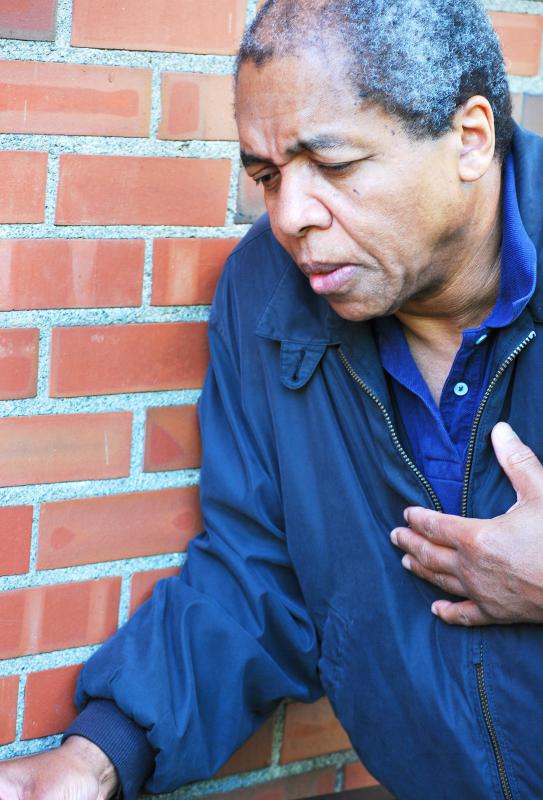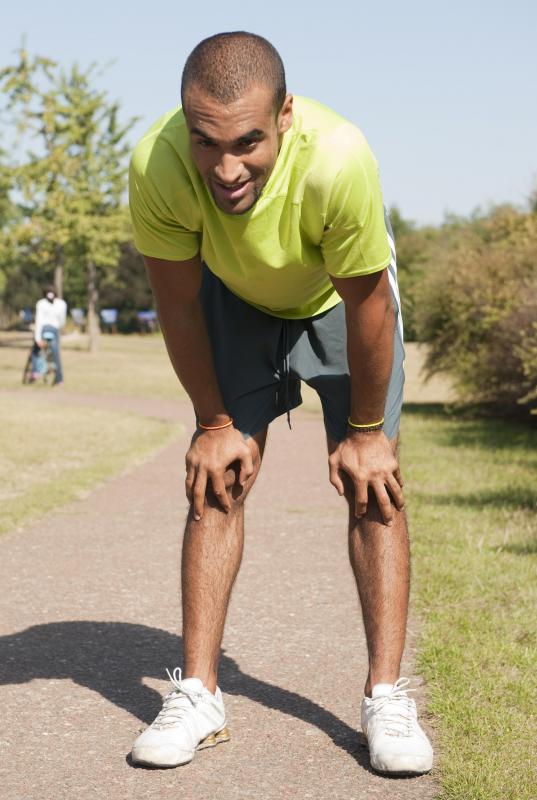At WiseGEEK, we're committed to delivering accurate, trustworthy information. Our expert-authored content is rigorously fact-checked and sourced from credible authorities. Discover how we uphold the highest standards in providing you with reliable knowledge.
What is a Bronchospasm?
Bronchospasm is a constriction or spasm of the bronchi. The bronchi refers to the two tubes that branch from the trachea to the lungs. Typically, bronchospasm occurs in people of any age, however, it can be especially ominous in infants. Generally, bronchospasm is experienced more frequently in those who suffer from asthma and bronchitis. Symptoms can range from mild to severe, however, many available treatments offer rapid and dramatic relief.
Generally, causes include asthma, emphysema, and bronchitis. In addition, severe allergic reactions and anaphylactic shock can induce acute bronchospasm. Sometimes, lung irritants such as chemicals, dust, and smoke can aggravate an already twitchy airway, and cause symptoms. In certain individuals, infections, exercise, and emotional stress can contribute to an episode. Exercise-induced asthma is a common medical condition, and if left untreated can contribute to an acute spasm of the bronchi.

Typically, symptoms include intense coughing, an increase in the production of mucus— which often becomes sticky and thick — and difficulty expectorating mucus from the lungs. In addition, trouble breathing, shortness of breath, and wheezing may occur. Sometimes, patients will experience chest pain and extreme anxiety. The respiration rate can sometimes increase to compensate for the inability to get air in and out of the lungs.

Usually, bronchospasm treatment includes bronchodilator medications that open up the airway, allowing for easier breathing. These medications are typically fast acting and generally begin to alleviate symptoms in about ten minutes. Bronchodilators work by relaxing the muscles of the airway and opening them up. Medications for acute spasms can be delivered via inhalation, orally, or by injection.

Sometimes intervention may be able to prevent an acute spasm from taking place. Identifying potential irritants or allergens that can trigger an attack can help reduce the frequency. In addition, because asthma is a common cause of bronchial spasms, taking prescribed asthma medications may stave off attacks. Sometimes the physician may prescribe anti-inflammatory medications as an ongoing treatment plan in an effort to keep bronchial swelling to a minimum.

Frequently, anxiety can exacerbate acute spasms of the respiratory system. This can cause hyperventilation and promote an increase in shortness of breath. In some cases, the physician may prescribe anti-anxiety medications to those who may be anxious in an effort to reduce nervousness and resultant shortness of breath. Severe episodes of acute bronchial spasms can be life-threatening and may require emergency medical evaluation and subsequent treatment.
AS FEATURED ON:
AS FEATURED ON:















Discussion Comments
@TheGraham - COPD sounds scary -- I'm sorry to hear that your grandma has it. Hopefully the doctors can find a cure someday.
If you don't have bronchitis, that means you don't have COPD, right? I'm curious if there are any cures or treatment of emphysema that can successfully reverse the damage. Floppy airways and the number of lung passages lessening sounds like it would make breathing a whole lot more difficult. It also sounds damaging, which tells me that of the two conditions COPD cover, emphysema is probably the part that isn't fixable, right? Inflammation is probably more treatable.
I have a cousin with asthma who should probably read this article, and this discussion. Thanks for sharing your comments about COPD.
Bronchospasm is one of the major symptoms of COPD -- Chronic Obstructive Pulmonary Disease. My grandma has COPD, so I've learned a lot about it to be able to assist her when she has a bronchospasm episode or is too short of breath to even get around the house or care for herself very easily.
COPD is the blanket term for having chronic bronchitis and another condition called emphysema. Bronchitis makes your airways constantly irritated and inflamed, which makes them produce lots of extra mucus.
Extra mucus and swelling is exactly what you don't want to have along with emphysema, which causes the airways to lose their shape and go floppy, narrow, and even for the number of passages in your lungs to decrease over time.
So basically, people with COPD have to put up with inflammation of their airways -- which were already narrowing even without the inflammation -- and filling up the remaining space with mucus. It's an unpleasant condition to have, and I can say from personal experience that it makes your loved ones feel helpless when you're having an episode and they can't do much for you.
COPD has no cure, by the way. At least doctors can treat grandma's COPD so that the symptoms ease up, though.
@aishia - If you look up the bronchospasm definition, you'll find that this word really just refers to any sudden constriction of the bronchial tubes that connect your lungs to your throat. With that in mind, no, you don't have to have bronchitis and/or asthma to have a bronchospasm episode.
Bronchospasm can be caused by lots of things -- allergic reactions due to eating food or taking medication such as penicillin that you are allergic to, as a known side effect for some drugs like hypertension medication, or even as the result of bad living conditions, such as a constant cold environment in your house.
Penicillin and other medications related to it are particularly known for causing bronchospasm which is why doctors are so concerned with whether you're allergic when they prescribe it to you.
While exercise induced bronchospasm is a common problem, it's not limited to people who are overweight. Thin people get exercise induced bronchospasm, too.
Breathlessness from being overweight is caused more by the excess of fatty tissue in the back of the throat, the same stuff that causes loud snoring and often sleep apnea in overweight people.
I wonder why exercise induced bronchospasm is such a common problem? Is it possible to develop an episode of bronchospasm simply from being overweight or out of shape, or do you have to have asthma or bronchitis on top of trying to exercise?
Working out must be a tall order for people with either of these lung conditions, because exercise naturally results in breathing hard, and breathing hard if you have a lung condition naturally results in it being hard for you to breathe at all.
How do people do it? Is there something you can take to widen your airways or something before working out?
Post your comments